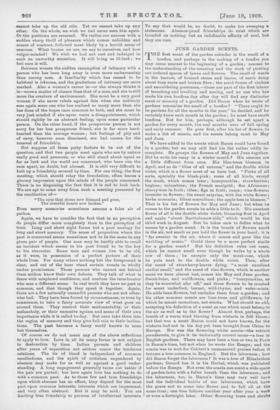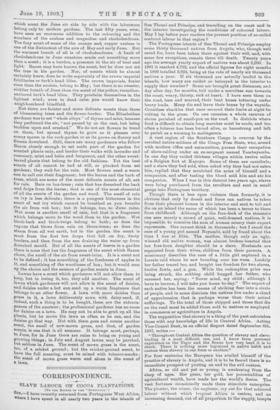JUNE GARDEN SCENTS.
THE first scent of the garden calendar is the smell of a bonfire, and perhaps in the making of a bonfire you may come nearest to the beginning of a garden; nearest to the Understanding of the meaning and the work of plotting out ordered spaces of lawns and flowers. The smell of weeds in the barrow, of bruised stems and leaves, of earth damp about torn roots and broken fibre ; the acrid fumes of cinders and smouldering greenness,—those are part of the first labour of trenching and levelling and sowing, and no one who has made his own bonfires day after dny will find any distincter scent or memory of a garden. Did Bacon when he wrote of gardens remember the smell of a bonfire ? "There ought to be gardens for all the months in the year," he decided, and he certainly knew each month in the garden ; he must have smelt bonfires. But for him, perhaps, although he set apart a garden for every month, the real months were of full spring and early summer. He goes first, after his list of flowers, to make a list of scents, and his scents belong most to May and June.
We have added to the scents which Bacon could have found in a garden, but we may still find his list rather oddly in- complete. He groups the flowers of May and June together. Did he write his essay in a winter month P His seasons are a little different from ours. His lilac-trees blossom in April, and so do " lilies of all natures," and the double white violet, which is a flower most of us have lost. " Pinks of all sorts, specially the blush-pink ; roses of all kinds, except the music, which comes later; honeysuckles; strawberries ; bugloss; columbine; the French marigold ; fibs Africanus ; cherry-tree in fruit; ribes ; figs in fruit; rasps ; vine-flowers; lavender in flowers ; the sweet satyrian, with the white flower; herba muscaria; lilium convalliu m ; the apple-tree in blossom." That is his lint of flowers for May and June ; but when he comes to the garden scents he adds a little to it, His sweetest flower of all is the double white violet, blooming first in April and again "about Bertholomew-tide," which would be the third week in August. But he takes care to define what lie means by a garden scent. It is the breath of flowers smelt in the air, not smelt as you bold the flower in your hand ; it is " far sweeter in the air, where it comes and goes like the warbling of music." Could there he a more perfect simile for a garden scent ? But his definition rules out roses, which he cannot smell even though he walks by a whole row of them ; be excepts only the musk-rose, which he puts next to the double white violet. Then, after the scent of strawberry-leaves dying, "a most excellent cordial smell," and the scent of vine-flowers, which is another scent we have almost lost, comes his May and June garden. Sweet-briar, and wallflowers, and pinks ; " honeysuckles, so they be somewhat afar off," and three flowers to be crushed for scent underfoot, burnt, wild-thyme, and water-mints. Ho adds bean-flowers, but excludes them from a garden; and his other summer scents are lime-trees and gilliflowers, by which he meant carnations, not stocks. What should we add, accepting his definition of a scent as one which must belong to the air as well as to the flower P Almost first, perhaps, the breath of a warm wind blowing from wistaria in full bloom ; but that was a scent Bacon could not have known, for the wistaria had not in his day yet been brought from China to Europe. Nor was the flowering white acacia—the robinia pseudacacia, to give it its technically correct name—a tree in English gardens. There may have been a tree or two in Paris in Bacon's time, but not when he wrote the Essays; and the acacia was to wait for Cobbett's unmeasured praises before it became a tree common in England. But the laburnum ; how did Bacon forget the laburnum? It was a tree of Elizabethan gardens; Gerard has it in his Herbal, which was published before the Essays. Not even the acacia can scent a wide space of garden-lawn with a fuller breath than the laburnum ; and the laburnum, too, in Bacon's time may very well have had the individual habits of our laburnums, which have the grace not to come into flower and to fall all at the same time ; one tree follows another year after year a week or even a fortnight later. Other flowering trees and shrubs which scent the Jane air side by side with the laiburnuin belong only to modern gardens. The last fifty years, even, have seen an enormous addition to the colouring and the numbers of the azaleas and magnolias and rhododendrons. The foxy scent of some of the orange and copper azaleas is one of the distinctest of the airs of May and early June. But the warmest breath of all is of rhododendrons. A bank of rhododendrons in Juno sunshine sends out something more than a scent ; it is a burden, a presence in the air of heat and light. Bacon may have known the scent, but ho does not set the tree in his garden. Nor, of scents which he almost certainly knew, does he write separately of the crown imperial fritillaries or turk's head lilies. The crown imperials, foxier even than the azaleas, belong to May; but there is no sweeter, sicklier breath of June than the scent of the yellow, vermilion- anthered turk's head lilies. They proclaim themselves in the lightest wind; even in dead calm you would know their neighbourhood blindfold.
But there are fainter and more delicate scents than those of blossoming trees and the flower-border. The Elizabethan gardener was to set " whole alleys " of thyme and mint, because they perfumed the air, "not passed by as the rest, but being trodden upon and crushed." We do not set flowers to tread on them, but spread thyme to grow as it pleases over sunny spaces in the rock-garden or as its grows on Surrey and Sussex downland. Still, there are many gardeners who follow Bacon closely enough to set aside part of the garden for scented plants only, and border their walks with lavender and rosemary, mint and balm and bergamot, and the other sweet- leaved plants that belong to the old fashions. Yet the best scents of all cannot be had at will, or plucked from set gardens ; they wait for the rain. Most flowers need a warm sun to call out their fragrance; but the leaves and the bark of trees, which are some of the most delicate scents of all, ask for rain. Rain on box-trees ; rain that has drenched the bark and drips from the leaves; that is one of the most elemental of all the scents of the garden and wood. The smell of rain on ivy is less delicate ; there is a pungent bitterness in the scent of wet ivy which cannot be breathed as you breathe the air from wet box; but it belongs, too, to Juno rains. Wet moss is another smell of rain, but that is a fragrance whicl► belongs more to the wood than to the garden. Wet birch-bark and birch-twigs belong to both ; so does the Vapour that blows from rain on thorn-trees; so does the steam from all wet earth, but in the garden the scent is most from the first few drops that fall on dry, dusty borders, and then from the sun draining the water up from drenched mould. But of all the scents of leaves in a garden there is none that has the fragrance of the scent which Bacon chose, the smell of the air from sweet-briar. It is a scent not to be defined ; it has something of the freshness of apples in it, and something of the woodiness of box; but it would sum np the choice and the essence of garden scents in June.
Lawns have a scent which gardeners will not allow them to keep, but in losing it, too, they add another. The scent of lawns which gardeners will not allow is the scent of daisies, and daisies under a hot sun send up a warm fragrance that belongs to no other flower. A lawn with more daisies than grass in it, a lawn deliberately sown with daisy-seed, if, indeed, such a thing is to be bought, these are the extrava- gances of the amateur; the professional gardener has no room for daisies on a lawn. He may not be able to grub up all the plants, but he mows the lawn as often as he can, and the daisies go that way. But with them goes and comes another scent, the smell of new-mown grass, and that, of garden Scents, is one that is all summer. It belongs most, perhaps, to June, for in June there are rains to bring on young and growing things; in July and August lawns may be parched, but seldom in June. The scent of mown grass is the scent, too, of a cricket ground; but the cricket-ground scent, to have the full meaning, must be mixed with tobacco-smoke ; the scent of mown grass warm and alone is the scent of a lawn.











































 Previous page
Previous page